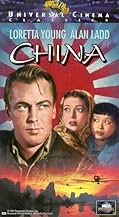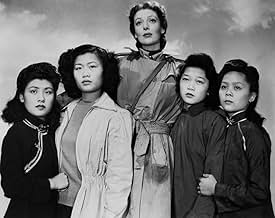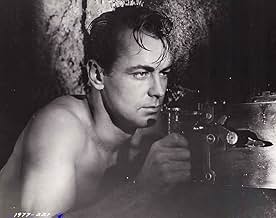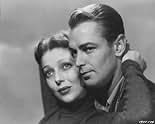Ajouter une intrigue dans votre langueDuring the Japanese invasion of China, a cynical, macho profiteer meets a compassionate, beautiful schoolteacher.During the Japanese invasion of China, a cynical, macho profiteer meets a compassionate, beautiful schoolteacher.During the Japanese invasion of China, a cynical, macho profiteer meets a compassionate, beautiful schoolteacher.
- Réalisation
- Scénario
- Casting principal
- Récompenses
- 2 victoires au total
Victor Sen Yung
- Lin Wei, Third Brother
- (as Sen Yung)
Doris Chan
- Student
- (non crédité)
Avis à la une
Shortly before Pearl Harbor, American opportunist Jones and partner Johnny are in China to sell oil to the invading Japanese army. Cynical about the sufferings of the Chinese, Jones meets compassionate teacher Carolyn Grant while travelling cross-country to Shanghai. Sparks fly between these strong-willed characters, neither budging an inch. But when Jones witnesses a Japanese atrocity, his feelings toward his customers (and Carolyn) begin to change...
A very good war adventure that starts leisurely, featuring a hard-headed American who sells oil to the Japanese and doesn't care about the atrocity caused. He's played by Alan Ladd, who does a good job as the grumpy trucker. William Bendix is a much more cheerful sidekick in contrast, and cares about people and even finds a baby amidst the war torn area.
Of course, Loretta Young as a teacher helping some Chinese kids reach their destination soon thaws Ladd's heart, and that's also helped by a surprising harrowing and brutal scene where they find the baby (Bendix had found), mother and father of a girl dead, and the girl in the house with Japanese soldiers in an implied assault scene. The action scenes are rousing and can be starkly brutal. The ending is quite shocking too with a redemptive note.
A very good war adventure that starts leisurely, featuring a hard-headed American who sells oil to the Japanese and doesn't care about the atrocity caused. He's played by Alan Ladd, who does a good job as the grumpy trucker. William Bendix is a much more cheerful sidekick in contrast, and cares about people and even finds a baby amidst the war torn area.
Of course, Loretta Young as a teacher helping some Chinese kids reach their destination soon thaws Ladd's heart, and that's also helped by a surprising harrowing and brutal scene where they find the baby (Bendix had found), mother and father of a girl dead, and the girl in the house with Japanese soldiers in an implied assault scene. The action scenes are rousing and can be starkly brutal. The ending is quite shocking too with a redemptive note.
This is no war propaganda but as sheer realism as could be accomplished in filming on the Apache trail of Arizona. The main asset of the film is therefore no great landscapes and interesting interiors of Chinese life but the actors and their relationships. The trio of William Bendix, Alan Ladd and Loretta Young is invincible in their glorious acting and characters, Alan Ladd and Loretta Young being at daggers drawn from the beginning but gradually being joined by the circumstances. Already the first scenes, a long shot with only William Bendix wandering at a loss among the ruins of a bombed city being under attack and ending up with a lost baby, is as impressive as if it was an Orson Welles invention. That quality is sustained throughout the film. Loretta Young will win your heart from the start, William Bendix will gain your sympathy from the beginning and increase it until the end, and Alan Ladd is at his very best, the toughest of guys but totally stoic. John Farrow made many efficient thrillers in the 40s and 50s, but I think this is his one outstanding war film. Victor Young graced it with his music, and the dialog is pertinent all the way. The suspense keeps increasing until the final crisis and climax, and then the war just continues. China had a hard time against the Japanese, the action of this film is prior to Pearl Harbour, although that incident is part of the finale, but the Chinese are depicted with great sympathy, also Chang Kai Shek. No mention of the communists - they came later.
Hollywood did not make a lot of films about the China component of World War II. When they did, they usually focused on Americans, with the Chinese appearing as supporting characters. (There are hardly any Chinese with speaking parts in John Wayne's FLYING TIGERS, for instance.) Anna May Wong made two war films, THE LADY FROM CHUNGKING and BOMBS OVER BURMA, in which she starred as a Chinese patriot leading resistance efforts, both in 1942 and both extremely low-budget. They're worth seeking out, chiefly for her performances, but I've never seen a decent print of either and don't know if one even exists.
John Farrow's CHINA (1943) is different from other films I've seen about the war in China. It foregrounds a trio of Americans, one female and two male, but the rest of the cast is nearly all Chinese and many of them have significant speaking parts. Even more importantly, the Chinese are proactive and drive the resistance efforts, with the two American men forced to go along, first reluctantly and then wholeheartedly. There are extended scenes of the Chinese conferring among themselves. This was extremely rare in Hollywood. Four of the five preeminent Asian-American actors in Hollywood at the time are in this film: Philip Ahn, Richard Loo, Victor Sen Yung, and Benson Fong. Only Keye Luke is missing. There are many Chinese actresses in the film as well.
The action takes place in 1941, just before Pearl Harbor, and the plot involves the flight of refugees from a bombed Chinese town in a transport truck driven by an American oil exporter, Davy Jones (Alan Ladd), who's been supplying gasoline to the Japanese and is eager to get to Shanghai to secure another deal. An American teacher, Carolyn Grant (Loretta Young), has a large group of female students with her and prefers to go to Chengdu where the girls will presumably be safer. Eventually a band of well-armed Chinese guerrillas show up and essentially take over, dictating to Jones and his partner, Johnny Sparrow (William Bendix), what route they're going to take. After witnessing an atrocity committed by the Japanese, Jones decides to fight alongside the guerrillas and participates in two major confrontations with the Japanese.
The film acknowledges Japanese atrocities committed in China with a reference to Nanking early on and a scene where three Japanese soldiers descend on a farmhouse and kill the occupants, leaving alive only a teenage girl whom they proceed to rape. This is presented as frankly as was possible at the time and it's unmistakable what has happened in the house. If the country wasn't at war, the scene would have been censored, but standards were relaxed during the war to allow for scenes like this that would outrage the audience and pump up their fighting spirit.
From a purely cinematic standpoint, the film is quite remarkable for other reasons. The opening sequence is one long, intricate tracking shot through a Chinese town as it's being bombed, with the camera following William Bendix as he rushes through the town, looking for Ladd, with debris falling around him, and stopping to pick up a baby crying on its mother's corpse. This sequence is filmed on an elaborate backlot set. The shot continues, thanks to an invisible cut, into a building shot on a studio interior, and then out again, thanks to another invisible cut. Director Farrow often employed extensive tracking shots, putting him in the company of such directors as Max Ophuls and, on occasion, Sam Fuller, Orson Welles, and Otto Preminger. Yet, because his work was seen as formula studio fare rather than that of an "auteur," Farrow has never gotten the critical reputation he deserved.
The two big action sequences in the film are masterfully shot. One, filmed entirely on the studio backlot at night, involves a raft trip across a river by Ladd, Bendix, Ahn and the resistance fighters to the Japanese camp to steal dynamite, erupting in a firefight when the Japanese discover them. Later, they set up dynamite charges along a mountain pass and have to climb up and place the charges in time to stop the Japanese advance. This was partly shot on location somewhere in California and is quite a suspenseful and spectacular sequence. Some of the Chinese girls on the trip participate in this mission.
CHINA was Ladd's fourth starring role—after THIS GUN FOR HIRE, THE GLASS KEY and LUCKY JORDAN. There's a touch of the GUN FOR HIRE killer about him, particularly in the early scenes where he's pretty contemptuous of the people he's asked to help. But he softens along the way, particularly in his tender scenes with Loretta Young. He's also a fierce fighter in the two big action scenes. At one point, he overhears the Chinese girls talking about him and they clearly think ill of him. One of the girls notices him and comes over to apologize and then asks him when he's going to kiss Miss Grant. She explains that she's seen numerous American movies and the hero is always kissing someone or shooting someone, sometimes both. It's quite a charming scene and the young actress, Marianne Quon, is quite good. It's a notable sequence for the way it frames the American hero in a third world country as someone who's not respected or admired, but actively distrusted. He has to earn their respect and trust in the course of the film. They're not working for him. He, in essence, is working for them. In Hollywood films like this, that was quite unusual.
Today, September 3, 2013, marks the centennial of Alan Ladd's birth. I've enjoyed the majority of the films of his that I've seen and would argue that CHINA is one of the best. For some reason this film never played on TV when I was growing up and I didn't get the chance to see it until I purchased a used copy on VHS from Amazon.
John Farrow's CHINA (1943) is different from other films I've seen about the war in China. It foregrounds a trio of Americans, one female and two male, but the rest of the cast is nearly all Chinese and many of them have significant speaking parts. Even more importantly, the Chinese are proactive and drive the resistance efforts, with the two American men forced to go along, first reluctantly and then wholeheartedly. There are extended scenes of the Chinese conferring among themselves. This was extremely rare in Hollywood. Four of the five preeminent Asian-American actors in Hollywood at the time are in this film: Philip Ahn, Richard Loo, Victor Sen Yung, and Benson Fong. Only Keye Luke is missing. There are many Chinese actresses in the film as well.
The action takes place in 1941, just before Pearl Harbor, and the plot involves the flight of refugees from a bombed Chinese town in a transport truck driven by an American oil exporter, Davy Jones (Alan Ladd), who's been supplying gasoline to the Japanese and is eager to get to Shanghai to secure another deal. An American teacher, Carolyn Grant (Loretta Young), has a large group of female students with her and prefers to go to Chengdu where the girls will presumably be safer. Eventually a band of well-armed Chinese guerrillas show up and essentially take over, dictating to Jones and his partner, Johnny Sparrow (William Bendix), what route they're going to take. After witnessing an atrocity committed by the Japanese, Jones decides to fight alongside the guerrillas and participates in two major confrontations with the Japanese.
The film acknowledges Japanese atrocities committed in China with a reference to Nanking early on and a scene where three Japanese soldiers descend on a farmhouse and kill the occupants, leaving alive only a teenage girl whom they proceed to rape. This is presented as frankly as was possible at the time and it's unmistakable what has happened in the house. If the country wasn't at war, the scene would have been censored, but standards were relaxed during the war to allow for scenes like this that would outrage the audience and pump up their fighting spirit.
From a purely cinematic standpoint, the film is quite remarkable for other reasons. The opening sequence is one long, intricate tracking shot through a Chinese town as it's being bombed, with the camera following William Bendix as he rushes through the town, looking for Ladd, with debris falling around him, and stopping to pick up a baby crying on its mother's corpse. This sequence is filmed on an elaborate backlot set. The shot continues, thanks to an invisible cut, into a building shot on a studio interior, and then out again, thanks to another invisible cut. Director Farrow often employed extensive tracking shots, putting him in the company of such directors as Max Ophuls and, on occasion, Sam Fuller, Orson Welles, and Otto Preminger. Yet, because his work was seen as formula studio fare rather than that of an "auteur," Farrow has never gotten the critical reputation he deserved.
The two big action sequences in the film are masterfully shot. One, filmed entirely on the studio backlot at night, involves a raft trip across a river by Ladd, Bendix, Ahn and the resistance fighters to the Japanese camp to steal dynamite, erupting in a firefight when the Japanese discover them. Later, they set up dynamite charges along a mountain pass and have to climb up and place the charges in time to stop the Japanese advance. This was partly shot on location somewhere in California and is quite a suspenseful and spectacular sequence. Some of the Chinese girls on the trip participate in this mission.
CHINA was Ladd's fourth starring role—after THIS GUN FOR HIRE, THE GLASS KEY and LUCKY JORDAN. There's a touch of the GUN FOR HIRE killer about him, particularly in the early scenes where he's pretty contemptuous of the people he's asked to help. But he softens along the way, particularly in his tender scenes with Loretta Young. He's also a fierce fighter in the two big action scenes. At one point, he overhears the Chinese girls talking about him and they clearly think ill of him. One of the girls notices him and comes over to apologize and then asks him when he's going to kiss Miss Grant. She explains that she's seen numerous American movies and the hero is always kissing someone or shooting someone, sometimes both. It's quite a charming scene and the young actress, Marianne Quon, is quite good. It's a notable sequence for the way it frames the American hero in a third world country as someone who's not respected or admired, but actively distrusted. He has to earn their respect and trust in the course of the film. They're not working for him. He, in essence, is working for them. In Hollywood films like this, that was quite unusual.
Today, September 3, 2013, marks the centennial of Alan Ladd's birth. I've enjoyed the majority of the films of his that I've seen and would argue that CHINA is one of the best. For some reason this film never played on TV when I was growing up and I didn't get the chance to see it until I purchased a used copy on VHS from Amazon.
This 1943 film, is in the realms of an Indiana Jones movie, with Alan Ladd wearing the leather jacket and black fedora hat.
I have to admit that the makers of this film, did a good job in creating China within their own native Hollywood.
Alan Ladd and Loretta Young both give good performances, who help a group of young Chinese students escape from the invading Japanese armies.
The supporting cast also give good performances.
There are lots of good action scenes, and the cinematography is excellent.
When I watched this film on dvd, I found the quality of the print, that was used to transfer this movie onto dvd was in perfect condition.
I have to admit that the makers of this film, did a good job in creating China within their own native Hollywood.
Alan Ladd and Loretta Young both give good performances, who help a group of young Chinese students escape from the invading Japanese armies.
The supporting cast also give good performances.
There are lots of good action scenes, and the cinematography is excellent.
When I watched this film on dvd, I found the quality of the print, that was used to transfer this movie onto dvd was in perfect condition.
Dusted off from long time in the vault, John Farrell's 'China' surprises. Allan Ladd plays a cynical, war profiteer, a part well chosen for him. He sells to the highest bidder: the Imperial Japanese waging war against the Nationalist troops, short of money, but not in men. And then there's doe eyed Loretta Young, born and bred in China and with missionary fervor remains in China to aid and assist her students, refugees. William Bendix as Ladd's side kick has a tender heart and is a sucker for an abandoned baby.
But the surprise are the Asian actors...Korean Philip Ahn, Chinese Richard Loo and Victor Sen Yung and Marion Quon, among others, who usually plays small parts in Chan Chin films.
Here, in 'China', at war, they have strong roles who force at the end of a barrel of a gun, to do as they want in their fight against the invading Japanese. They are forceful, intelligent and well able to fight with the Americans playing as it turns out to be in the background.
Amazing? In a way, our allies in the fight against Japanese militarism, but in the US declared by act of Congress as a 'cursed minority', restricted in immigration, forced to live in ghettos quaintly known as 'China towns',centers of opium dens, intrigue and possibly engaged in white slavery.
All the prejudice aside, 'China' is an exception. The Chinese characters speak good, standard ordinary English and are robust in character and know what they want to free China from Japanese aggression.
Of course, Ladd has a change in heart, helps the Chinese to entrap Japanese troops. And in that he's ennobled by his sacrifice for all that's good and pure in America; he finds love in Young, and Bendix remains true to his heart.
It's a pity, it is not shown on the television or in cinema clubs.
Le saviez-vous
- Anecdotes"Lux Radio Theater" broadcast a 60 minute radio adaptation of the movie on November 22, 1943 with Loretta Young, Alan Ladd and William Bendix reprising their film roles.
- Citations
Blonde Russian: What's that?
Johnny Sparrow: A baby. What do you think it is - Donald Duck?
- ConnexionsFeatured in The Movie Orgy (1968)
Meilleurs choix
Connectez-vous pour évaluer et suivre la liste de favoris afin de recevoir des recommandations personnalisées
- How long is China?Alimenté par Alexa
Détails
Box-office
- Budget
- 2 000 000 $US (estimé)
- Durée
- 1h 19min(79 min)
- Couleur
- Rapport de forme
- 1.37 : 1
Contribuer à cette page
Suggérer une modification ou ajouter du contenu manquant





























